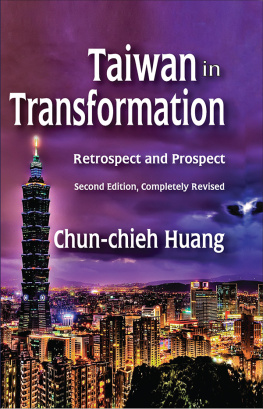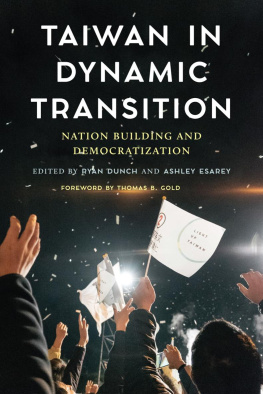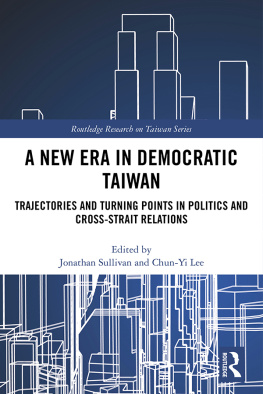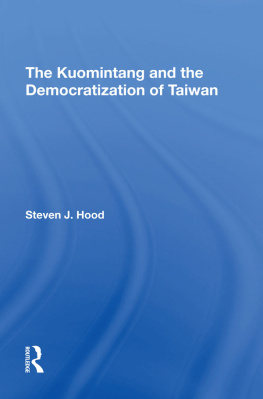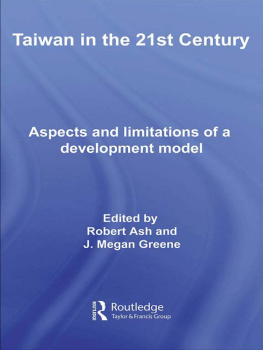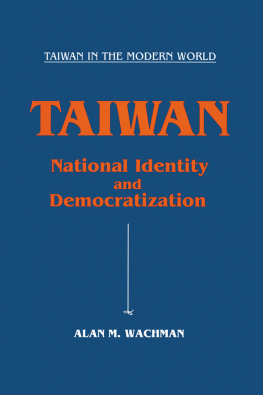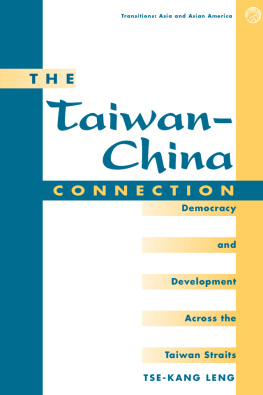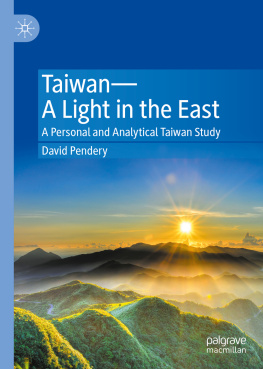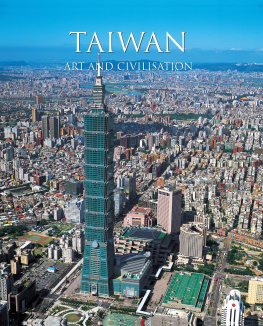First published 2014 by Transaction Publishers
Published 2017 by Routledge
2 Park Square, Milton Park, Abingdon, Oxon OX14 4RN
711 Third Avenue, New York, NY 10017, USA
Routledge is an imprint of the Taylor & Francis Group, an informa business
Copyright 2014 by Taylor & Francis.
All rights reserved. No part of this book may be reprinted or reproduced or utilised in any form or by any electronic, mechanical, or other means, now known or hereafter invented, including photocopying and recording, or in any information storage or retrieval system, without permission in writing from the publishers.
Notice:
Product or corporate names may be trademarks or registered trademarks, and are used only for identification and explanation without intent to infringe.
Library of Congress Catalog Number: 2013042980
Library of Congress Cataloging-in-Publication Data
Huang, Junjie, 1946-
Taiwan in transformation : retrospect and prospect/Chun-chieh Huang.--Second Edition, Completely Revised.
p. cm.
Includes index.
ISBN 978-1-4128-5392-7 (cloth : alk. paper)
1. Taiwan--Social conditions--1895-1945. 2. Taiwan--Social conditions--1945- 3. Social change--Taiwan. 4. Taiwan--History--1945- 5. Taiwan--Foreign relations--China. 6. China--Foreign relations--Taiwan. 7. Taiwan--Civilization. I. Title.
HN748.2.H83 2014
306.0951249--dc23
2013042980
ISBN 13: 978-1-4128-5392-7 (hbk)
The last decade of the twentieth century witnessed rapid changes not only in global politics but also in Taiwans quests for new identities. The notorious period of martial law was finally lifted in July 1987, and long-repressed calls for democratization began to be heard, and caught worldwide attention. In sync with Taiwans economic transformations, its entire world of thought also underwent significant changes. Both economic and ideological restructuring have been basic elements of Taiwans postwar transformation. Meanwhile, rapid democratizationhailed by some politicians as the second Taiwan miraclehas opened a Pandoras box and stirred up a whirlwind of discord in Taiwan. Self-assertiveness and egocentrism verging on narcissism are just a few of the many centripetal forces at work in democratic Taiwan today. Is the old Taiwanese work ethic just a relic of the past? Is Taiwans good-hearted native openness now collapsing into narcissistic decadence? Must Taiwan journey through an Armageddon of ideological wars?
The present volume contains nine of my essays on Taiwans transformation, examining its origins and looking toward its future destinations. Thus this book deals with some key problems that arose from the whirlpool of history, problems that can only be grasped and solved within the context of history, particularly the formation of Taiwanese consciousness and cross-strait relations. In essence, I seek to show that historical insights extrapolated from an understanding of history are indispensable if we seek to grasp and solve the basic problems facing Taiwan at present, including the Taiwan-Mainland relationship.
As a more westernized frontier of the Chinese communities in East Asia, Taiwan has the advantages of a mature industrial infrastructure and a budding political democracy, which together boost its economy. However, the root of Taiwans problems is that its people lack a historical consciousness when facing historical questions. Few Taiwanese can view their problems within a historical context. Admittedly, this shortcoming is not unique to the Taiwanese; it is equally discernible in American and European experts seeking to discuss problems in China. In this book, I aim to situate the transformation of Taiwanespecially the development of Taiwanese consciousness that, since the lifting of martial law, has given rise to a dynamic ethos in Taiwanwithin the frame and context of history.
Whereas East Asias pressing problems are usually identified as economic and political in nature, I maintain that only mutual historical understanding can solve the dilemma for people living across the strait. In addition to being Homo politicus, as Aristotle argued, or Homo economicus, as modern man insists, we are also Homo historicus, both shaping and being shaped by history, spiders working the web of history that crisscrosses the globe. In this book I argue that the solutions to problems facing the Chinese living on either side of the Taiwan Strait are to be found only in history.
This book represents a Taiwanese historians reflections on the transformation of postwar Taiwan. I was born and raised in Taiwan; I am also a professional historian. This twofold biographical edge makes me an insider with an objective outlook. I have an inner understanding of Taiwan because I was born, raised, and educated here. But I also have an objective understanding of Taiwan because of the historical perspective I take.
Having reflected on Taiwans changing social psychology, particularly noting the rise of narcissism, I have found the new self-centeredness of the Taiwanese vividly and concretely revealed, for example, in the public and administrative responses to the spring 2003 outbreak of SARS. Some hospitals in Taipei were particular focal points of public selfishness and administrative incompetence. Initially, hospital administrators misdiagnosed a number of cases and went on to send patients away in a panic. Later, public officials set up quarantines for suspected SARS cases. But, misinformed about the meaning of quarantine, affected citizens complained that it violated basic human rights before self-righteously breaking out of the quarantine areas. Some SARS patients left their hospital wards and went to other hospitals, not confessing their exposure to the SARS virus and thus spreading the ailment to other medical facilities. One doctor who had worked with SARS patients boldly went on a tour to Japan without waiting to see whether he had been infectedto the consternation of Japanese authorities. Even a scholar who had been exposed to the virus in Hong Kong flew to America in order to avoid being quarantined in Taiwan, thus endangering everyone he encountered. As the phantom of SARS was wandering across the island of Taiwan, all of these events attested vividly to the problem of egocentrism in Taiwan today, a major theme of the present study.
Of course, nobodys viewpoint, no matter how personal and objective, can enjoy universal assent, much less be assured of its validity, whatever that means in this context. Thus ultimately, what I offer in this volume are simply the personal views of a private citizen, though humbly and conscientiously thought through. In light of these admitted shortcomings, I thank my readers for their understanding.
Chun-chieh Huang
Taipei, 2004

